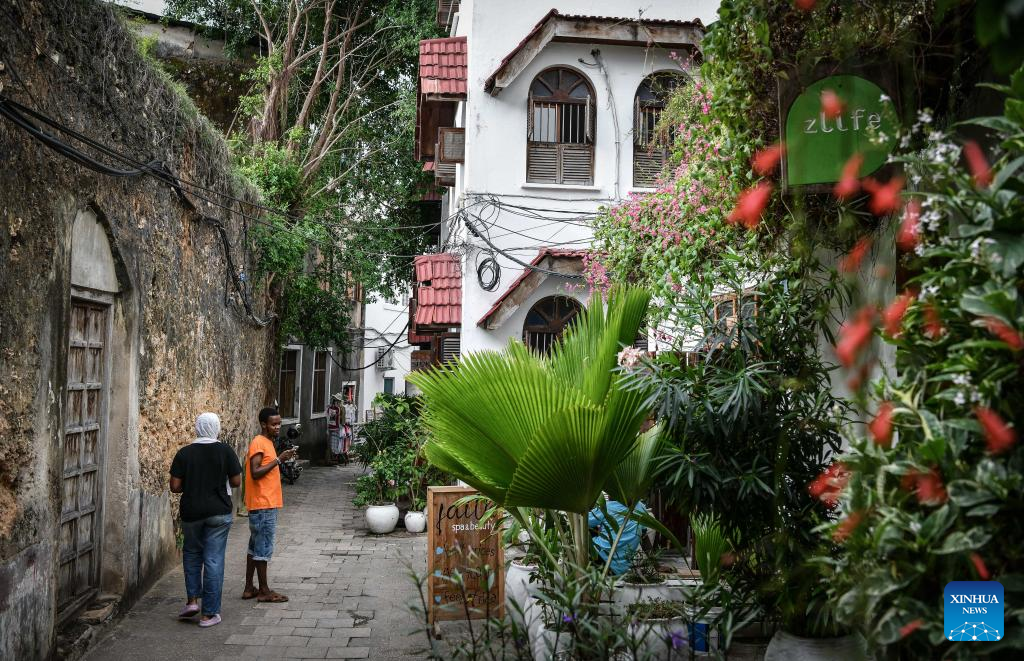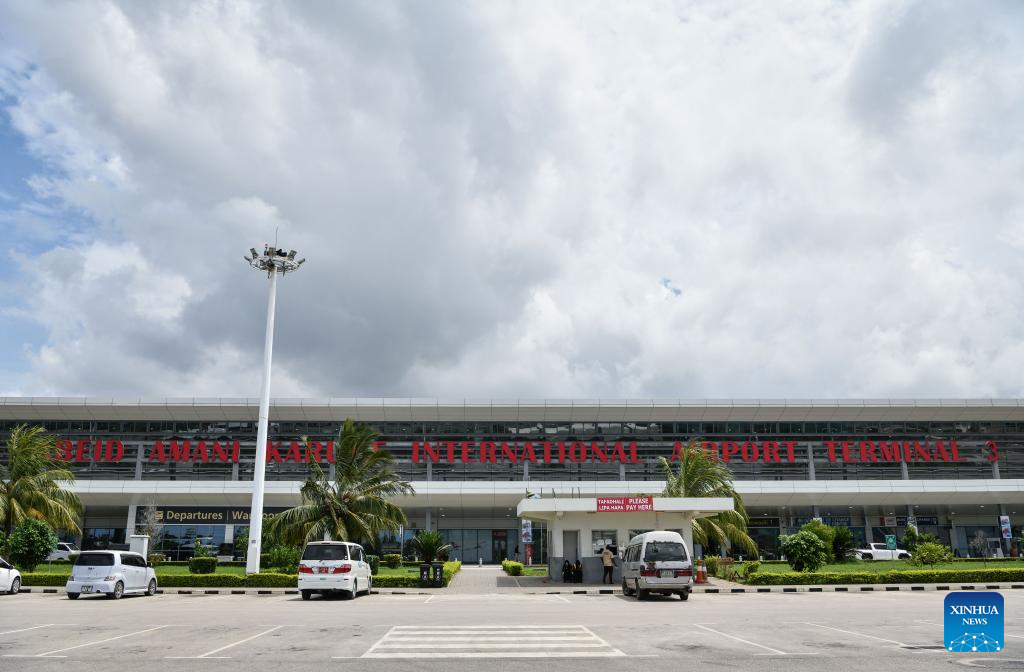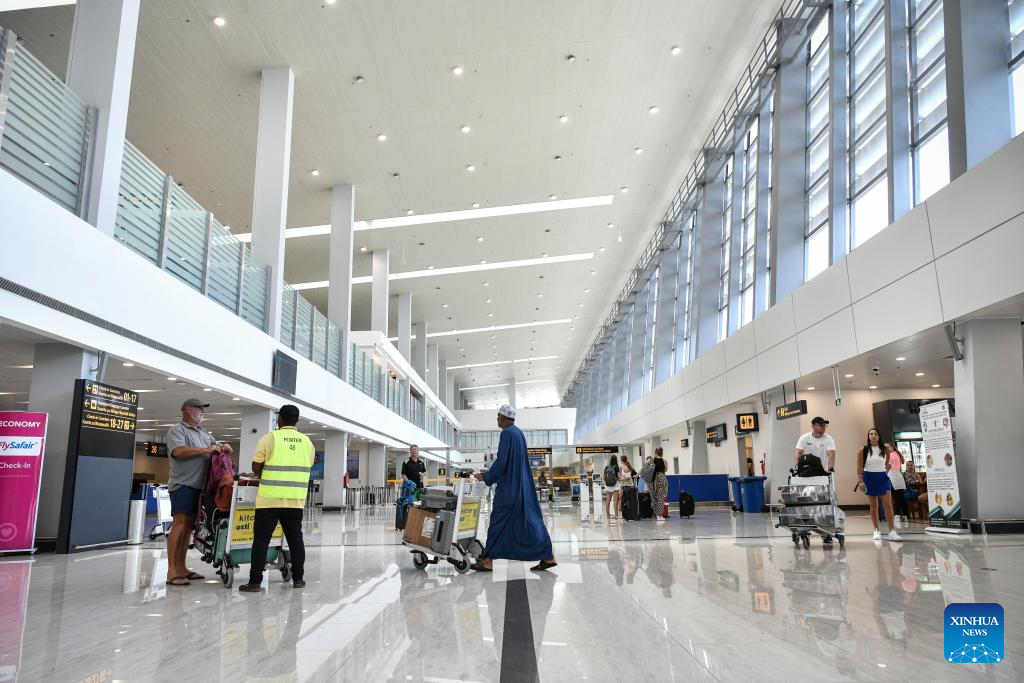
This photo taken on Dec. 10, 2024 shows a street view in the Stone Town in Zanzibar, Tanzania. (Xinhua/Han Xu)
DAR ES SALAAM, Dec. 14 (Xinhua) -- Strong ties between Tanzania and China have paved the way for cooperation in economic, technical, and many other fields, with the Asian country now marked as one of the emerging markets for the archipelago, a senior tourism official of Tanzania's Zanzibar has said.
In a recent interview with Xinhua, Aboud Suleiman Jumbe, principal secretary for Zanzibar's Ministry of Tourism and Heritage, said China's support to Zanzibar under the Belt and Road Initiative has facilitated infrastructure construction, thereby improving the living conditions of local people.
"This is not happening out of the blue but is being planned. It is the bilateral process of strong relations between Tanzania and China, a political process that has paved the way for economic cooperation, technical collaboration, and many other things," Jumbe said.
Zanzibar, anchored about 35 km off Tanzania's east coast, is a string of multiple islets and two major islands, Unguja and Pemba. Dubbed the "Pearl of the Indian Ocean," the Tanzanian archipelago attracts tens of thousands of overseas travelers annually for its mesmerizing natural scenery and historic sites, including the World Heritage-listed Stone Town.
On the most-visited Unguja island, Terminal 3 of Abeid Amani Karume International Airport, constructed and built by a Chinese company, served as the main gateway for international passengers.
Meanwhile, Nyerere Road, the artery linking the airport to Stone Town, has also been freshly renovated with the help of Chinese builders. The project of upgrading 100-km routes in the core city area and constructing two flyovers is nearing completion.
"Without the support of the Chinese government and the Chinese constructors, it would have taken us many years to complete these projects," said Jumbe. "These projects, completed within four years, would have taken 15 or 20 years under normal conditions in Zanzibar."
Data from the Office of the Chief Government Statistician Zanzibar (OCGS) flagged tourism as one of the pillar drivers of growth and job creation in the semi-autonomous region, accounting for 27 percent of Zanzibar's gross domestic product and 80 percent of its foreign exchange earnings.
"With the greatest contribution from China, Zanzibar is now transforming its critical infrastructure for the tourism industry," Jumbe said, touching upon the recent project of constructing a fourth terminal at the international airport.
"We are now receiving more arrivals per year at Zanzibar airport than at Dar es Salaam airport. It's the second year in a row. Because people want to come to Zanzibar and then go to the mainland to see the wildlife," the principal secretary said. "Before that, they would come to the mainland, land in Zanzibar, go back to the mainland, and fly out."
According to Jumbe, Zanzibar has enjoyed a strong history of cooperation with China, especially in such areas as medicine and health. As for tourism, he said the two sides "need to scale up" partnerships based on those already-achieved projects.
The senior tourism official outlined several specific areas in which Zanzibar and China can further deepen their cooperative relations in the years to come, such as conference and exhibition tourism, health tourism, educational tourism, sports tourism and others.
"Most of all, we need China's state-of-the-art engineering model to help us rebuild and repair our heritage structures in line with UNESCO (United Nations Educational, Scientific and Cultural Organization) preservation standards," Jumbe said. "China has so many ancient heritage sites, many of which are not on the UNESCO list, but the Chinese government is preserving them very well."
In addition, China has become one of the emerging markets recognized by the Zanzibar authorities. The OCGS revealed in its latest statistical release that the region welcomed 1,450 Chinese visitors in October, a significant increase of 161.3 percent compared to the same month last year.
Jumbe pointed out that in Zanzibar, about 73 percent of international tourists come from European countries like Italy, France, and Germany, which implies "an over-dependence on Europe."
"We want to diversify our international arrivals and open up to countries like China, Singapore, and India," he said. "Even if less than 0.1 percent of Chinese tourists come to Zanzibar, it will be a big group for us."
Jumbe recalled that when he was a child, he heard the story about Zheng He of China's Ming Dynasty, when the renowned navigator visited the coast of East Africa, including Zanzibar.
"I really think it's a moment of pride for us. It gives us this strong bond that existed before the Europeans came. We have been communicating with China from the Ming Dynasty to the present day," the official said.
He added that the current cooperation between the two sides is an example of "how the history of relations with China has been able to transform Zanzibar's critical infrastructure systems that support the secondary economic systems, such as tourism, trade, transportation, and even energy." ■

This photo taken on Dec. 10, 2024 shows an exterior view of the Terminal 3 of Abeid Amani Karume International Airport in Zanzibar, Tanzania. (Xinhua/Han Xu)

This photo taken on Dec. 10, 2024 shows an interior view of Abeid Amani Karume International Airport in Zanzibar, Tanzania. (Xinhua/Han Xu)

Aboud Suleiman Jumbe, principal secretary for Zanzibar's Ministry of Tourism and Heritage, speaks in an interview with Xinhua in Zanzibar, Tanzania, on Dec. 9, 2024. (Xinhua/Han Xu)
